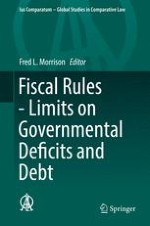2016 | OriginalPaper | Chapter
8. Limitations on Government Debt and Deficits: The Netherlands
Authors : Michal Diamant, Michiel L. van Emmerik, Gert Jan Geertjes
Published in: Fiscal Rules - Limits on Governmental Deficits and Debt
Publisher: Springer International Publishing
Activate our intelligent search to find suitable subject content or patents.
Select sections of text to find matching patents with Artificial Intelligence. powered by
Select sections of text to find additional relevant content using AI-assisted search. powered by
